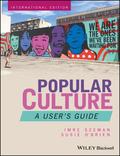Popular Culture
A User's Guide, International Edition

1. Edition September 2017
384 Pages, Softcover
Wiley & Sons Ltd
Popular Culture: A User's Guide, International Edition ventures beyond the history of pop culture to give readers the vocabulary and tools to address and analyze the contemporary cultural landscape that surrounds them.
* Moves beyond the history of pop culture to give students the vocabulary and tools to analyze popular culture
* suitable for the study of popular culture across a range of disciplines, from literary theory and cultural studies to philosophy and sociology
* Covers a broad range of important topics including the underlying socioeconomic structures that affect media, the politics of pop culture, the role of consumers, subcultures and countercultures, and the construction of social reality
* Examines the ways in which individuals and societies act as consumers and agents of popular culture
* Numerous learning features including case studies, real-life examples, suggested activities, boxed features, a glossary, and an instructor's manual
Acknowledgments xiii
1 Introducing Popular Culture 1
Approaching Popular Culture 1
Defining Popular Culture 2
Popular Culture Invades the Classroom 12
The Americanization of Popular Culture 14
The Decolonization of Culture 15
Culture and Economics--The Postindustrial Revolution 17
Why This? Why Now? Why Me? A Couple of Final Arguments for the Importance of Studying Popular Culture 18
Coffee as Popular Culture 19
And It All Boils Down To...What Is in a Cup of Coffee? 27
Suggestions for Further Reading 28
2 The History of Popular Culture 29
Taking It from the Streets 29
Making the Streets Safe for Commerce 30
Popular Recreation before 1830 31
Capitalism and the Industrial Revolution 32
Popular Recreation and Resistance 38
The Production of Commercial Mass Culture--the Birth of the Culture Industry 43
Continuities and Changes 49
Suggestions for Further Reading 55
3 Representation and the Construction of Social Reality 57
Truth2Power 57
Constructing a Crisis--the Discourse of Violent Youth 58
Signification--the Production of Social Sense 59
Representing the Youth Crisis 63
Truth2Power: The Politics of Representation 75
Contexts of Representation 79
Representation in Contemporary Culture 86
Suggestions for Further Reading 89
4 The Production of Popular Culture 91
The Business of Culture 91
"Money Changes Everything": The Pitfalls of Thinking about Production 93
The Culture Industry Thesis 96
Shifting Modes of Cultural Production 106
Cultural Production Today 112
Suggestions for Further Reading and Viewing 122
5 The Consuming Life 123
Back to "Normal" 123
A Brief History of Consumer Culture 126
Consumption as Distinction 135
Consumption, Desire, and Pleasure 140
The Politics of Consumption 142
Suggestions for Further Reading and Viewing 148
6 Identity and the Body 151
Identity--a Necessary Fiction? 151
The History of Identity--Some Different Theories 153
Hegemonic Masculinity, Postfeminism, and the Third-Wave 161
LGBTQ+ 168
Different Bodies, Different Selves? 172
Altered States 176
Suggestions for Further Reading 182
7 Identity, Community, Collectivity 183
Who Do You Want Me to Be? 183
"The People Who Are Ours" 187
Modern Identities: Nation, Empire, and Race 191
Nation and Empire 197
Postcolonial Identities 200
Postnational Identities: Melted, Frozen, Reconstituted 204
Community or Collectivity? 210
Suggestions for Further Reading 212
8 Subcultures and Countercultures 213
The Mainstream and Other Streams 213
Subcultures and Countercultures: What Is the Difference? 217
Popular Representations of Subcultures and Countercultures 221
The Politics of Subcultures 229
Suggestions for Further Reading 240
9 Space, Place, and Globalization 243
(Dis)Locations of Popular Culture 243
Private versus Public Space 246
Inside Out 255
The Big Picture: Globalization? 262
Is Globalization Real? 264
Globalization and Popular Culture 271
Globalization: What's Next? 279
Suggestions for Further Reading 279
10 Popular Culture in the Twenty?]First Century 281
In with the New? 281
Many Popular Cultures? 283
New Technology and Its Discontents 287
Lost Generation? 301
What Is Next? 309
Suggestions for Further Reading and Viewing 310
Glossary 311
Works Cited 327
Index 345
Susie O'Brien is Associate Professor in the Department of English and Cultural Studies at McMaster University, Canada. Her research and teaching focus on postcolonial and environmental cultural studies. She has published on postcolonial literature, the slow and local food movements, scenario planning, and the temporality of globalization. She is co-editor of Time, Globalization and Human Experience (forthcoming 2017) and is currently working on a monograph on the power and vulnerability of resilience stories.


